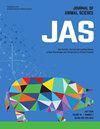PSVII-9 Improvement of feed efficiency in Korean Hanwoo cattle: investigation of feed intake and analysis of residual feed intake (RFI)
IF 2.7
2区 农林科学
Q1 AGRICULTURE, DAIRY & ANIMAL SCIENCE
引用次数: 0
Abstract
Feed efficiency is an important economic trait in beef cattle production, and improving feed efficiency can reduce production costs and environmental impact. Residual feed intake (RFI) is a useful measure of individual feed efficiency, representing the difference between the actual feed intake of an animal and its predicted feed intake based on its body weight (BW) and growth. This study aimed to investigate feed intake and analyze RFI in Hanwoo cattle to improve feed efficiency. Data were collected from 120 Hanwoo steers (9 to 11 mo old) from six different test stations across the country. Individual daily feed intake of concentrates and forage was recorded over 70 d, and BW was measured at the beginning and end of the feeding trial. Daily feed intake was calculated using the TDN values of the concentrates and forage. Expected feed intake was estimated using a linear regression model based on metabolic BW and daily gain. RFI was calculated as the difference between expected and actual feed intake. Average daily gain ranged from 1.05 to 1.71 kg/d, and average daily feed intake ranged from 5.10 to 7.72 kg/d across the test stations. RFI values ranged from -0.84 to 0.95 kg/d, indicating significant variation in feed efficiency among the animals. This study provides valuable information on feed intake and RFI in Hanwoo cattle. Further research with a larger dataset is needed to develop a genetic evaluation model for RFI and to select animals with superior feed efficiency for improving Hanwoo cattle production.PSVII-9 提高韩国韩宇牛的饲料效率:调查采食量并分析剩余采食量 (RFI)
饲料效率是肉牛生产中一个重要的经济特征,提高饲料效率可以降低生产成本,减少对环境的影响。剩余采食量(RFI)是衡量个体饲料效率的一个有用指标,代表了动物实际采食量与根据体重(BW)和生长情况预测的采食量之间的差值。本研究旨在调查汉宇牛的采食量并分析 RFI,以提高饲料效率。从全国六个不同的试验站收集了 120 头韩宇牛(9 至 11 月龄)的数据。在 70 天内记录了每头牛每天的精料和饲料摄入量,并在饲养试验开始和结束时测量了体重。日采食量根据精料和饲料的 TDN 值计算得出。使用基于代谢体重和日增重的线性回归模型估算预期采食量。RFI 计算为预期采食量与实际采食量之差。各试验站的平均日增重为 1.05 至 1.71 千克/天,平均日采食量为 5.10 至 7.72 千克/天。RFI值介于-0.84至0.95千克/天之间,表明动物之间的饲料效率存在显著差异。这项研究提供了有关汉和牛采食量和RFI的宝贵信息。需要利用更大的数据集开展进一步研究,以开发 RFI 遗传评估模型,并筛选出饲料效率更高的动物,从而提高汉宇牛的产量。
本文章由计算机程序翻译,如有差异,请以英文原文为准。
求助全文
约1分钟内获得全文
求助全文
来源期刊

Journal of animal science
农林科学-奶制品与动物科学
CiteScore
4.80
自引率
12.10%
发文量
1589
审稿时长
3 months
期刊介绍:
The Journal of Animal Science (JAS) is the premier journal for animal science and serves as the leading source of new knowledge and perspective in this area. JAS publishes more than 500 fully reviewed research articles, invited reviews, technical notes, and letters to the editor each year.
Articles published in JAS encompass a broad range of research topics in animal production and fundamental aspects of genetics, nutrition, physiology, and preparation and utilization of animal products. Articles typically report research with beef cattle, companion animals, goats, horses, pigs, and sheep; however, studies involving other farm animals, aquatic and wildlife species, and laboratory animal species that address fundamental questions related to livestock and companion animal biology will be considered for publication.
 求助内容:
求助内容: 应助结果提醒方式:
应助结果提醒方式:


